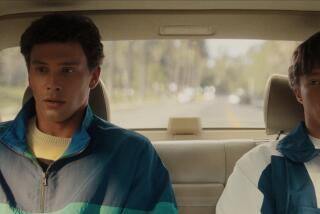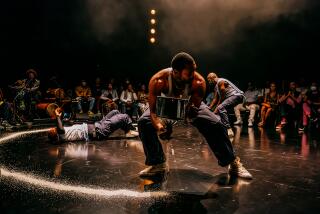Squabbling Siblings Reveal the Menace of Mankind : THE HUNDRED BROTHERS by Donald Antrim; Crown $20, 208 very small pages
- Share via
It is the clown car joke, reversed and grandly expanded. Instead of eight clowns popping out of a mite-sized automobile, 100 brothers squeeze into one large room. Ludicrously casual, the narrator of Donald Antrim’s allegorical tale attempts to tell us a little about each, as if he were introducing us around some normally sized family reunion.
There is Barney, the doctor; Sergio, the conservative polemicist; Siegfried, the metal sculptor; Alfred, who is blind; Spencer, the secret agent; Maxwell, the tropical botanist (subject to fits); the irritating Fielding, who insists on filming everyone; Zachary, the very large bully; Virgil, the pitiful wimp; and on and on for three pages or so--by which point the narrator has more or less given up and bunched them in a series of improbable statistics. There are, our narrator tells us, one set of triplets, four sets of identical twins and 11 brothers born on the same day in different years.
It is a nice start; a mess, of course, but an encouraging mess, as if the late S.J. Perelman--lunacy without tears--were parodying the late Donald Barthelme--lunacy with not only tears, but droplets of Armageddon. After a while, though, the lunacy in “The Hundred Brothers” sticks in place; and the Armageddon--the dismaying message beneath the absurdity--turns out familiar and perfunctory.
The gathering takes place in the waterlogged library of a broken-down mansion belonging to the brothers’ dead father. “The time had arrived, finally, to stop being blue, put the past behind us, share a light supper and locate, if we could, the missing urn of the old f-----’s ashes,” Doug, the narrator, explains. Outside, a mass of the huddled poor camp in winter weather; inside, the brothers’ ostensible peacemaking is belied by the shoving, the pinpricks, the angry retorts, the tiny outbreaks of violence which their effortful cordiality makes all the more uneasy.
Maxwell, for example, collapses in a kicking fit on the floor. Barney, the doctor, is knocked cold when he goes to attend him. Doug, borrowing Barney’s stethoscope to help out, manages to smash it across Maxwell’s nose and promptly clamps his hand over his brother’s mouth to muffle the scream. Blood gushes out, ruining Doug’s necktie, which he has somehow knotted around Maxwell’s neck. He tries to loosen it--or is he tightening it? “I felt oppressed by the stupidity and smallness of life,” he remarks with absurd inconsequentiality.
The Cain-Abel glimmerings are interrupted by the dapper Bertram, who arrives to proffer sartorial advice about the tie. “It’s got a lot of maroon in it already, and it’s pretty dark overall. Plus, it’s not glossy. The weave will conceal discoloration.”
Brief alliances and sudden antagonisms form and re-form among the hundred brothers jammed into the room. As they shove past each other to get to the “light supper”--masses of pork chops, actually--the atmosphere of menace thickens. Bit by bit, it focuses more and more on Doug, the only one who never manages to get anything to eat or drink.
The menace becomes more explicit with the after-dinner game: a reenactment of the old English corn king ritual, in which one masked player is “sacrificed” to ensure a good crop. Now it is Doug who plays the part. He flees through a maze of bookcases as wind and freezing rain blow through the open windows, the floor floods and plaster crumbles from the ceiling. Armed with knives and broken-off chair legs, his brothers surround him. The sacrifice turns real even as Doug’s account of it continues, blandly goofy to the end.
Four years ago, Antrim’s “Mr. Robinson for a Better World” was published. It too was a Barthelme-like mix--the plays of Joe Orton also come to mind--of absurdist comedy with menace underneath. There, with a story of a whole suburban community going violently mad, the comedy was vigorous, unbelted and had room to breathe and astonish--even though the dark lesson was fairly obvious and not particularly original.
“The Hundred Brothers” falls into a trap of constriction. Crowded together, the brothers’ absurdist games become repetitious. The contrast of jokey cordiality with deadliness remains much the same throughout; the plot builds but the drama doesn’t.
Its dark lesson is pretty much the same as “Mr. Robinson’s.” Monsters are bred not only from the sleep of reason as in Goya, but from its waking exercise. Civilized society is only a porous membrane away from savagery when its members’ energies and passions are directed at nothing more than self-fulfillment (ignoring the wretched camped outside).
Antrim makes this lesson an intellectual construct, though. We do not feel a genuine savagery or a motivating darkness in the brothers. What we get is an illustration of savagery, an illustration of darkness.
More to Read
Sign up for our Book Club newsletter
Get the latest news, events and more from the Los Angeles Times Book Club, and help us get L.A. reading and talking.
You may occasionally receive promotional content from the Los Angeles Times.










